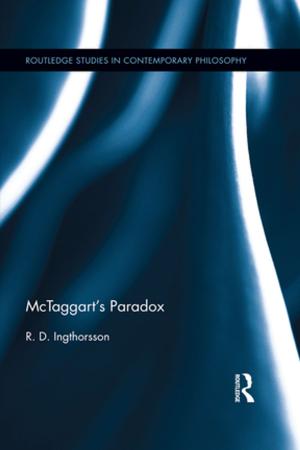The Near and Distant God
Poetry, Idealism and Religious Thought from Holderlin to Eliot
Fiction & Literature, Literary Theory & Criticism| Author: | Ian Cooper | ISBN: | 9781351194617 |
| Publisher: | Taylor and Francis | Publication: | December 2, 2017 |
| Imprint: | Routledge | Language: | English |
| Author: | Ian Cooper |
| ISBN: | 9781351194617 |
| Publisher: | Taylor and Francis |
| Publication: | December 2, 2017 |
| Imprint: | Routledge |
| Language: | English |
"Poetry and philosophy from the time of Kant to the mid-twentieth century are centrally concerned with the question of how the Spirit - or the Holy Spirit - is present in the world. This book argues that the development of modern poetry in German and English can be seen as a protracted response to the religious crises of post-Idealist thought. The German tradition develops through poets such as Holderlin as much as through philosophers such as Hegel and Nietzsche, and in England German ideas profoundly influenced the British Idealist school. Cooper's compelling study makes parallel readings of German and English writers with deeper historically-based affinities than has previously been realised. Eduard Morike and Gerard Manley Hopkins, both churchmen, each studied Idealism as undergraduates in their respective countries: each responded to it in his spiritual verse. And we find similar parallels in two of the defining works of twentieth century poetry: between Rilke's response to Nietzsche in the Duino Elegies, and Eliot's response to Bradley in the Four Quartets. Ian Cooper is Centenary Research Fellow at Selwyn College, Cambridge."
"Poetry and philosophy from the time of Kant to the mid-twentieth century are centrally concerned with the question of how the Spirit - or the Holy Spirit - is present in the world. This book argues that the development of modern poetry in German and English can be seen as a protracted response to the religious crises of post-Idealist thought. The German tradition develops through poets such as Holderlin as much as through philosophers such as Hegel and Nietzsche, and in England German ideas profoundly influenced the British Idealist school. Cooper's compelling study makes parallel readings of German and English writers with deeper historically-based affinities than has previously been realised. Eduard Morike and Gerard Manley Hopkins, both churchmen, each studied Idealism as undergraduates in their respective countries: each responded to it in his spiritual verse. And we find similar parallels in two of the defining works of twentieth century poetry: between Rilke's response to Nietzsche in the Duino Elegies, and Eliot's response to Bradley in the Four Quartets. Ian Cooper is Centenary Research Fellow at Selwyn College, Cambridge."















